- English
- Español

Department for Effective Public Management
- The Secretariat
- Electoral Cooperation and Observation
- Sustainable Democracy and Special Missions
- Effective Public Management
Universal Civil Identity Program in the Americas (PUICA)
PUICA supports the member states of the OAS in their efforts to eradicate under-registration, in order to ensure recognition of the right to civil identity for all persons in the region.
Objetives
- Universalization and accessibility of civil registry and the right to identity
- Strengthening of policies, public institutions, and national legislation
- Public participation and awareness
- Identification of best practices
- Promoting international and regional cooperation
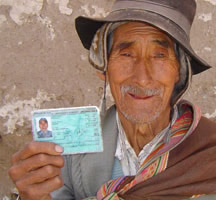 |
AG/RES. was adopted in the General Assembly of the year 2008. 2362 (XXXVIII-O/08) Inter-American program for the Universal Civil registration and right to identity. This program entrusts the General Secretariat of the OAS to assist Member States in their efforts to achieve universality and accessibility of the civil registry, and comply with the goal of universal birth registration by 2015.
Identity is a fundamental human right, which has been historically recognized in several international legislative bodies:
- Universal Declaration of Human Rights (1948)
- Article 6: Everyone has the right to recognition everywhere as a person before the law.
- Article 15: Everyone has the right to a nationality.
- American Declaration of the Rights and Duties of Man (1948)
- Article 17: Every person has the right to be recognized everywhere as a person having rights and obligations, and to enjoy the basic civil rights.
- Article 19: Every person has the right to the nationality to which he is entitled by law and to change it, if he so wishes, for the nationality of any other country that is willing to grant it to him.
- Convention on the Rights of a Child (1948)
- Article 7: The child shall be registered immediately after birth and shall have the right from birth to a name, the right to acquire a nationality and. as far as possible, the right to know and be cared for by his or her parents.
- Article 8: States Parties undertake to respect the right of the child to preserve his or her identity, including nationality, name and family relations as recognized by law without unlawful interference.
Why is civil identity essential?
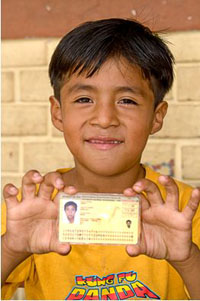
Currently, some 10% of children born in Latin America and Caribbean officially do not exist as their births were never recorded. This means that the states have no proof of their existence and that those children will therefore have no protection from a variety of violations and will also be excluded from basic services. In terms of the adult population, there are no accurate data on the number of people who were never registered, and the percentages vary significantly from country to country and from region to region within countries. What is certain is that poverty is a constant factor where there is under-registration, and that the latter mainly affects the most vulnerable populations.
This means that States have no record of their existence and therefore these children and adults will remain limited from access to a range of services and rights they would otherwise be guaranteed.
On one side, civil identity is indispensable for the exercise of civil, political, economic, social and cultural rights, as well as to give effect to the rights to nationality, the name, legal personality and family ties.
Likewise, civil identity is of vital importance to the strengthening of democratic governance that allows citizens to participate actively in the political life of a State, in exercise of their right to vote.
In addition, universal civil registration is the basis to enable States to have precise information about the population and which will allow them to develop their social and economic plans.
Universalization and improvement of Civil Registration
In this aspect, the PUICA priorities are reducing the rate of under registration and the removal of barriers to effective registration which can be achieved through the following strategies:
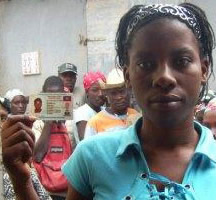
- Implementation of mobile registration campaigns,
under the registration to inaccessible places. - Implementation of mobile registration campaigns, bringing registration to inaccessible places.
- Implementation of birth registry systems in hospitals.
- Recovery of destroyed records.
Strengthening policies, public institutions, and national laws relating to civil registration
Through institutional strengthening, generation of synergies in national registration institutions, and improvement of legislative techniques, PUICA seeks to ensure that the outcomes obtained by the intervention will be sustained over time and thus make progress permanent.
The strategies that the program has developed to achieve this sustainability are:
- Training activities of officials, registration authorities and community leaders.
- Implementation of technologies and systems in civil registry operations.
- Systematization of interventions for further replication.
- Development of legal frameworks for the processes of modernization.
- Strengthening the security of records and systems of communication between their units.
- Integration of civil registration with other state agencies and social programs.
Increasing public participation and awareness
Theatric work at a school to explain to children the importance of being registered
The participation of the communities served in project design and execution is a defining feature of the PUICA strategy. This participation is both at the stage prior to design and subsequent campaign coordination and promotion.
Awareness among the population and among the institutions about the importance of the right to identity is also vital to the elimination of under-registration. Hence PUICA wants awareness to be a very important component of its strategy, and incorporates it into campaigns through awareness workshops in schools and health centers.
Identification and promotion of best practices
In their effort to spur access to civil records, national registration institutions have been continually come up with practices that are delivering positive results. In this regard, the work undertaken by PUICA is to identify those practices and provide a forum for them to be disseminated and shared. Collaboration is also being pursued with the CLARCIEV (Latin American Council for Civil Registration, Identification, and Vital Statistics), the body that brings together civil registration institutions in the region, thus enabling knowledge transfer among the region’s registration institutions. Since 2009, PUICA has served as Executive Secretariat of CLARCIEV, and manages that institution’s website.
In 2010, PUICA published its “Handbook of Civil Registration Best Practices,” which contains a methodology for identifying those best practices and a description of best practices identified in Mexico, Peru, and Colombia.
Promoting international and regional cooperation
A key element of the PUICA strategy is the promotion of partnership – between and among different countries of the Region, and between and among local and international cooperation players, the aim being to:
- Map institutions representative of the areas, prior to the execution of a project, for the purpose of including them in design and implementation;
- Reach agreements with other international cooperation agencies, such as the agreement reached with UNICEF and the Inter-American Development Bank;
- Promote inter-agency partnerships in projects to strengthen civil records, supporting civil society participation.
Belize
Modernization of the Vital Statistics Unit
Utilizing the applications and procedures developed for the Eastern Caribbean, PUICA has initiated a program of modernization of the Vital Statistics Unit in Belize. The program includes a new application for entering and verifying information on births, deaths and marriages as well as providing hardware upgrades, including a new server and a Bookdrive scanner, which captures the images of all vital registries in the country. The scanning and storage of these documents not only preserves important historical documents, it also ensures the quick reference to source documentations to facilitate accuracy and efficiency. The upgraded application will facilitate the issuance of birth certificates to newborns as well as generate vital statistical data for planning and designing public policies and development projects. The one-year project, financed through a generous contribution from the Government of Chile, contemplates onsite technical assistance and intense training for the officials of the Vital Statistics Unit.
Bolivia
Mobile registration and publicity campaigns
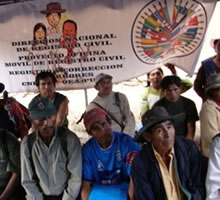 Through mobile registration and publicity campaigns in the Yungas, Manco Kapac, Beni and Chuquisaca regions, and in collaboration with the National Civil Registry Bureau of Bolivia, the right to identity is now a reality for more than 15,000 individuals, most of them indigenous.
Through mobile registration and publicity campaigns in the Yungas, Manco Kapac, Beni and Chuquisaca regions, and in collaboration with the National Civil Registry Bureau of Bolivia, the right to identity is now a reality for more than 15,000 individuals, most of them indigenous.
It is expected that by 2011 about 6,000 people in the rural areas of Potosi will have benefited from this mobile registration system.
Both operations have been funded through the Spanish International Development Cooperation Agency (AECID).
Caribbean Region: Antigua and Barbuda, Dominica, Grenada, St. Kitts and Nevis, Saint Lucia, and St. Vincent and the Grenadines
Civil registry modernization. Computerization of records
The objective in this region is to digitize the information contained in record books at the civil registries for vital records; primarily for births, deaths and marriages.
Additionally, this data will be stored in a searchable database using a customized Caribbean Civil Registry and Identity System (CCRIS) application with the registries having the ability to edit these records and print certificates on a secure media for issuing to the citizens in the country. It is expected that after an initial six (6) month period where a significant majority of work to digitize these historical records, which date as far back as 1905 would have been captured, the member states will integrate the project into their daily operational procedures.
The Canadian cooperation agency is funding the execution of this project, along with funds from USA and Chile.
El Salvador
Strengthening the Hospital Records System
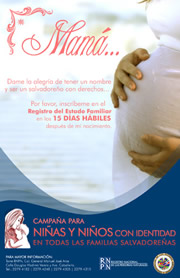
Since 2008, PUICA has supported the National Registry of
Natural Persons in the implementation of a hospital
registry of the National Hospitals of Sonsonate and
Ahuachapan. Between January and October 2011,
6.842 entries have taken place, 74% of births in the
offices of these two hospitals. Since opening in
December 2008 (Sonsonate) and August 2009 (Ahuachapan),
there have been 16.589 entries. The project contemplates
a continuous effort to raise awareness of the importance
of an identity at birth. Currently, an agreement is planned
to be signed with the Ministry of Health which will allow
the opening of offices in different hospitals of El Salvador
and shortly the opening of a third project office at the
Hospital San Miguel. The proposed hospital system in
El Salvador was funded by grants from the Spanish Agency for
International Development Cooperation (AECID).
Guatemala
Mobile registration and publicity campaigns. Institutional strengthening. Process audits
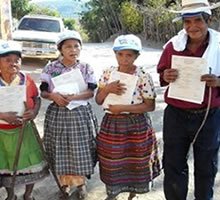 Several registration and publicity campaigns have been staged in different parts of the country – including Chichicastenango, San Pedro Sacatepequez, San Juan Sacatepequez, San Raimundo, and Huehuetenango – in collaboration with the National Registry of Persons. Through training for community leaders and with their collaboration, more than 2,000 people, mostly indigenous, were registered for the first time.
Several registration and publicity campaigns have been staged in different parts of the country – including Chichicastenango, San Pedro Sacatepequez, San Juan Sacatepequez, San Raimundo, and Huehuetenango – in collaboration with the National Registry of Persons. Through training for community leaders and with their collaboration, more than 2,000 people, mostly indigenous, were registered for the first time.
At the request of the Government of Guatemala, PUICA also audited the National Registry of Persons processes in 2010 and is supporting that institution as it implements the recommendations.
As with the Bolivia and El Salvador operations, the projects executed in Guatemala were funded by the Spanish Cooperation Agency.
Haiti
Modernization and integration of the Haitian civil registry system
The Haiti project is made up of three components:
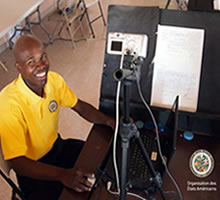 1. Support to the National Identification Office (ONI): To this date more than 4.8 million Haitians (85% of the adult population) now have been registered as a result of mobile registration campaign. In turn, the staff of the ONI has been trained, equipping the facility with the necessary technology and infrastructure to allow the opening of 141 offices across the country.
1. Support to the National Identification Office (ONI): To this date more than 4.8 million Haitians (85% of the adult population) now have been registered as a result of mobile registration campaign. In turn, the staff of the ONI has been trained, equipping the facility with the necessary technology and infrastructure to allow the opening of 141 offices across the country.
It is also important to note that PUICA accompanied the National Identification Office in the process of preparation for the 2011 presidential elections, supporting the reissuing of lost ID cards, issuance of new documents and distributing them.
2. Support to the National Archives of Haiti (ANH): More than 14 million historical records have been digitalized in an electronic database, and 80 operators have been trained who are responsible for entering the information into the system.
3. Support to the registration of minors in the Civil Registry: The support in this area consists in the implementation of census campaigns, pilot registration projects in hospitals, and an effort to revise and modernize the law governing the national registration system.
This project is being implemented with financial support of the Canadian International Development Agency (CIDA/ACDI). PUICA also works with the National School of Public Administration, Quebec, and with other national and international actors.
Honduras
In a joint effort with municipal leaders, a campaign of registry and awareness was implemented in Choloma. Different registry training sessions were offered, and plans were developed to replicate the campaign at a national level and thus reduce under registration.
Mexico
Promotion of Civil Identity. Sharing Best Practices. Awareness
In Mexico, the strategy is based on cooperation with the National Registry of Population and Personal Identification to promote civil identity nationwide. To that end, an international symposium on measuring under-registration of births was held, and a workshop on best practices in civil registration technologies was conducted, along with a number of publicity campaigns to promote the importance of civil identity.
Canadian cooperation funds have helped these projects to be financially viable.
Paraguay
Modernization of the Civil Registry. Digitizing Historical Records. Binational Civil Registry mobile campaign, in border with indigenous communities.
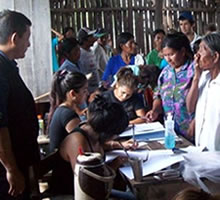 With PUICA’s contribution of computer equipment and technical support, the staff of civil registry has digitized 2.943.000 of a total of 9.127.000 of birth, marriage and death records, already entered in the database. Interoperability is contemplated between the registry and other public entities in order to provide greater transparency in the management, minimize bureaucracy, generate reliable statistics and preserve original documents. The creation of the database of the Civil Identity Registry has been possible through non-reimbursable financial cooperation from the Canadian International Development Agency and a loan from the Inter-American Development Bank.
With PUICA’s contribution of computer equipment and technical support, the staff of civil registry has digitized 2.943.000 of a total of 9.127.000 of birth, marriage and death records, already entered in the database. Interoperability is contemplated between the registry and other public entities in order to provide greater transparency in the management, minimize bureaucracy, generate reliable statistics and preserve original documents. The creation of the database of the Civil Identity Registry has been possible through non-reimbursable financial cooperation from the Canadian International Development Agency and a loan from the Inter-American Development Bank.
At the beginning of 2012, PUICA will support the Civil Registry by carrying out mobile registration campaigns in indigenous communities in the border with Bolivia, where a significant number of people do not have a birth certificate or identity card and therefore, have no access to state social programs. This project is funded by the German Agency for International Cooperation.
Peru
Mobile registration and publicity campaigns. Rebuilding destroyed records
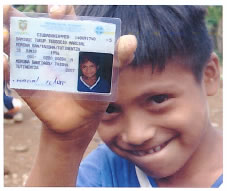 Through the system of mobile registration and publicity campaigns, more than 15,000 people have been registered in Peru. The campaigns were done in Huaycán, San Juan de Lurigancho, and Huancavelica. The records destroyed by the armed conflict with the Shining Path in this latter town were also reconstructed.
Through the system of mobile registration and publicity campaigns, more than 15,000 people have been registered in Peru. The campaigns were done in Huaycán, San Juan de Lurigancho, and Huancavelica. The records destroyed by the armed conflict with the Shining Path in this latter town were also reconstructed.
These projects were funded with help from Spain, USA, and Italy.
The Caribbean: Antigua and Barbuda, Dominica, Grenada, St. Kitts and Nevis, Saint Lucia, and St. Vincent and the Grenadines
Civil registry modernization. Computerization of records
The objective in this sub region is to consolidate civil registry electronic databases by digitizing historical records.
The Canadian cooperation agency is funding the execution of this project, along with funds from USA and Chile.
Organization of Eastern Caribbean States
A project is being developed for the consolidation of electronic databases of civil the registers of the member states of the Organization of the Caribbean Eastern States, which aims to ensure greater protection of information, facilitate the decentralization of services and streamline operations. Beneficiary countries: Antigua and Barbuda, Dominica, Grenada, St Kitts and Nevis, St. Lucia, St. Vincent and the Grenadines.
Donor: Canadian Agency for international development, Chile, United States.
Regional activities
In addition to technical assistance projects, PUICA organizes regional activities such as meetings, workshops and activities of horizontal cooperation with other institutions of civil registry in the region.
Contáctenos
1889 F St., N.W.,
Washington,
D.C., U.S.A. 20006
Correo electrónico:[email protected]
Teléfono: (202) 458-3778
Fax: (202) 458-3832
Equipo de trabajo
- Steven Griner
Specialists
- Mariana Costa
- Raúl Esparza
- Paul Hughes
- Clara Hoyos
- Diego Molina
- Marta Serrano
Administrative Official
- Nubia González
Assistant
- Mariaby Hernández
